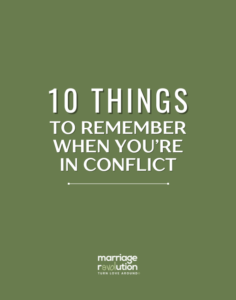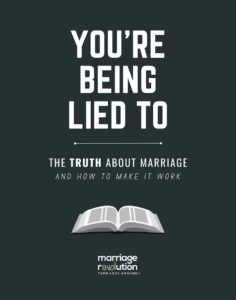News flash: Marriage is hard.
Have you ever thought about why? Think about it from a spiritual perspective. When you join a sinner to another sinner, and put them in the same house, sleeping in the same bed, and then you throw a couple little sinners in the mix…it’s a recipe for utter disaster. It’s a wonder any of us are making it!
All marriages fight. Good marriages know how.
Don’t Be Surprised By Conflict
The first step to resolving conflict? Embrace the reality that you will have conflict in your marriage. In fact, if there’s not, I would question the level of intimacy and transparency you are experiencing.
Let me clarify. I’m not saying every marriage should be having knock-down, drag-out fights every day. But I am saying that when you have 2 unique, sinful people in a 1 flesh relationship there will be regular occurrences of disagreement and selfishness.
Let me put it this way. I can’t remember the last day that there wasn’t an opportunity for me to confess something to my wife–and I’m not talking in response to an explosion of conflict. Our fights don’t get there every day, but they do happen occasionally. But there are times every day, in fact, multiple times a day, where our selfishness or pride surges into conversations or actions (or lack thereof) with each other. Mishandled, each of these minor ambushes can easily turn into a sinful argument.
When you experience conflict, don’t act as if something strange or extraordinary is happening to you. You’re experiencing the reality of what it looks like when two sinners are joined together.
“…Yet those who marry will have worldly troubles…”
1 Corinthians 7:28
The Most Important Step When Resolving Conflict
Be prepared to face the reality of your own sin, and your spouse’s, every day. In that order. When faced with conflict, always consider your own sin more and before the sin of our spouse.
Although there are several principles that are important to resolving conflict well, I believe this one is possibly the most important. Failing to put this step into practice will likely short circuit any attempts at fighting well.
Along with remaining the most important, I believe it is the most challenging. Why? Our sin of pride is always fiercely rebelling against it.
None of us like to be wrong. But I believe we are wrong far more than any of us realize.
In fact, I might go as far to say that there has never been a conflict where only one person is at fault. Put another way: I don’t believe any of us have ever perfectly loved another in the midst of a conflict. There is always fault on both sides–yes, to differing degrees. But we simply aren’t capable of loving perfectly.
“If we claim to be without sin, we deceive ourselves and the truth is not in us.”
I John 1:8
Based on this truth, and in response to any conflict, we should always be asking the question, “How have I contributed to this conflict?” Get as specific and “minuscule”–since we always underestimate the impact of our own sin–as possible.
Or more simply ask, “How have I been wrong?”
“Why do you look at the speck of sawdust in your brother’s eye and pay no attention to the plank in your own eye? How can you say to your brother, ‘Let me take the speck out of your eye,’ when all the time there is a plank in your own eye? You hypocrite, first take the plank out of your own eye, and then you will see clearly to remove the speck from your brother’s eye.”
Matthew 7:3-5
Here are three ways to help you discern how you are wrong, since sin by nature is innately, profusely blinding:
1. Believe that there is always something for you to take responsibility for in an argument.
2. Ask God honestly and willingly, “Search me, God and know my heart; test me and know my anxious thoughts. See if there is any offensive way in me, and lead me in the way everlasting.” Psalm 139:23-24
3. In humility and teachability, ask your spouse, “Can you please help me to see how you believe I’m wrong?”
In the midst of an argument, this is much easier said than done. But it’s possible with God’s all-seeing, all-knowing help.
Put Wheels On What God Reveals
Being aware of how you were wrong in a conflict is one thing. Expressing it is another. Don’t go halfway! Go the distance with your awareness and confess it to your spouse.
If consistent, unresolved conflict is a cancer, unexpressed confession is the refusal for known treatment with a superb, proven prognosis. Very few of us, knowing a problem was growing within us, would put off proven treatment. Even if there were a scalpel involved, we wouldn’t put off treatment until after the golf tournament or the Super Bowl. Because after the scalpel is healing; it’s getting your life back. Knowledge of the inward corrosion is vain without tenaciously pursuing treatment–and the luminous promises of the future beyond.
Recognize up front that in a real life conflict at least three things will tempt you to marginalize or altogether skip this critical step.
1. You think your spouse is more wrong than you. Don’t let your perception of who’s more at fault dictate the order of who confesses first. Your gentle admission may be the single instrument God longs to use to lead your spouse to accept their part. Humility and full, mature responsibility for our own contributions–not severity of fault–should dictate who acknowledges sin first in a conflict.
2. Your spouse is exaggerating how they think you were wrong. How you respond is key. Your primary task is not to clarify or defend what is being said about you. Your job is to take responsibility for 100% of whatever portion is true about you–even if only 1% of it is truth! Although not always, there is generally at least a degree of truth (however exaggerated) to what is being said about you in an argument. But the path to fighting fair is to readily discern and accept responsibility for the truth. Clarifying error can come later, and usually gets cleared up in response to a genuine admission of the 1%.
3. You will feel the need to clarify the facts of the argument before you confess. This might be the most violated principle of fighting fair that I see in my office. Yes, the facts are important; I recognize that they mean a difference between right and wrong. But your understanding of justice does not trump in importance the person with whom you are arguing. When we prioritize delineating facts over loving people, things get nasty: “Knowledge puffs up, while love builds up” (1 Corinthians 8:1). Honestly, you could square away all the facts and leave your marriage in their wake. In truth, sometimes the facts obscure the much more meaningful issues and interests obscured beneath their surface. When we focus on loving our spouse in spite of a discrepancy of facts, the facts take their rightful place and the conversation lends itself to a mutually respectful resolution of the true conflict.
Don’t wait. Confess.
Here are a few things to remember when you do:
-
-
- Be immediate in your confession (Ephesians 4:26) so that you don’t allow a root of bitterness to form in your spouse and so not to give Satan a foothold. Finally, do it for the health your own body and soul (Psalm 32: 1-5)!
- In addition to confessing to your spouse (James 5:16), acknowledge your sin against God (Psalm 51:4).
- Stay away from, “I’m sorry”–a bit easier to say, and less laden with meaning. Say, “I was wrong.”
- Be specific in your confession, “I was wrong for…”
- Ask, “Am I missing anything?” Oftentimes we don’t see our faults with perfect clarity. In part, God gave us a spouse to help us see our blind spots. Invite your spouse to help you see your faults more clearly.
- Ask, “How did my actions make you feel?” Then, listen!! But don’t just listen with your mind, listen with your heart. Put yourself in their shoes. Ask God to help you identify with their pain.
- Pray for and express empathy for how your sin has affected your spouse (Romans 12:15). This is the “secret sauce” of resolving conflict. This is where some really good attempts at resolution go south. Resolution is more than an intellectual exchange, it requires an emotional connection. As you listen to and understand your spouse’s feelings, expressing empathy will start to melt the hurt away. After your exchange, you might even ask your spouse, “Do you feel I understand your pain?”
- With the previous steps as a foundation, ask, “Will you please forgive me?” This is the “close” of resolving conflict. Resolving conflict involves an exchange between 2 people. Ask for forgiveness and wait for an answer.
-
Set as your goal to make confession a culture in your relationship–and home–as opposed to a sporadic practice in response to only the “big” conflicts.
There should be very few days, if any, that go by where you aren’t in some way shape or form confessing something to your spouse.
If you practice sincere confession in the small moments, it will prepare you to freely confess in the big moments when they come.

Hans co-founded Marriage Revolution with his wife, Star, in 2010. He counsels couples in The Woodlands, TX, speaks at marriage conferences around the country, and provides leadership and direction to Marriage Revolution.









